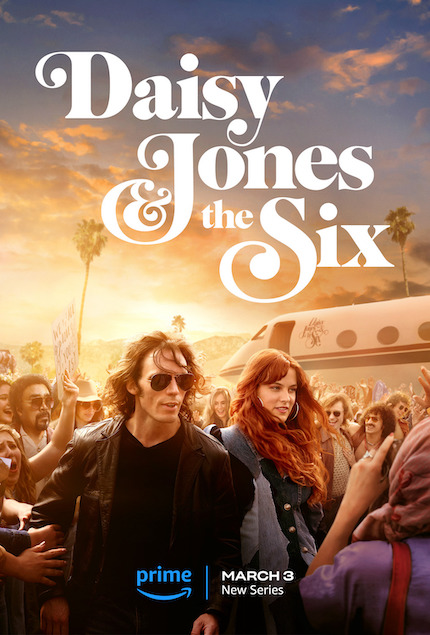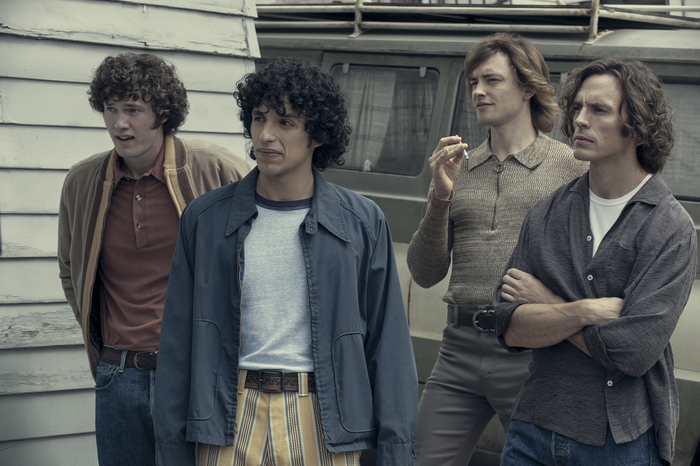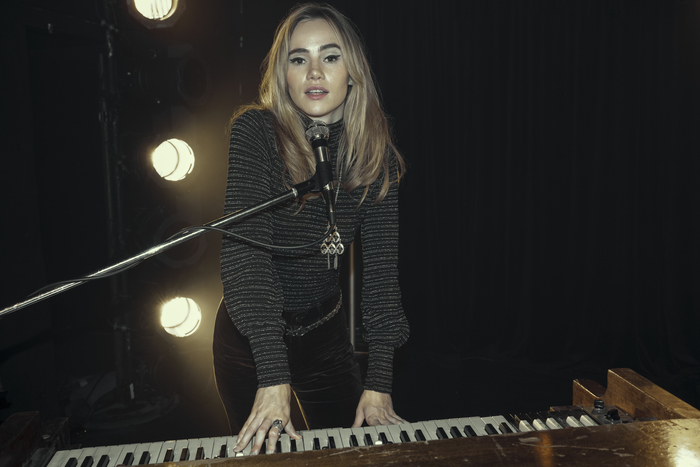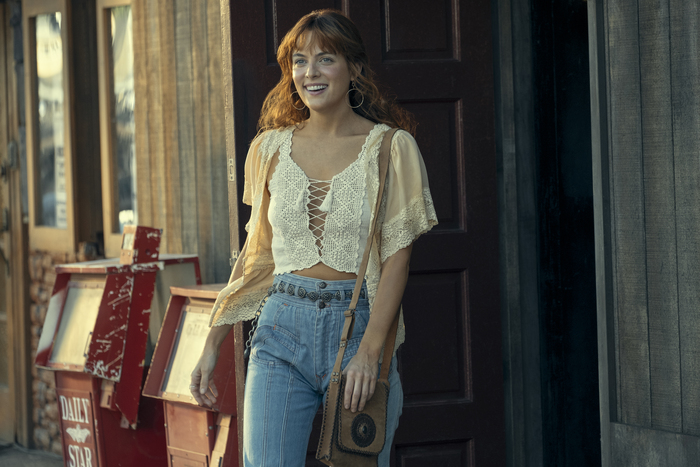DAISY JONES & THE SIX Review: Out of Tune
Riley Keough, Sam Claflin and Camila Morrone star in the Prime Video limited series, telling a fictional 70s rock 'n' roll melodrama.

Promises, promises, promises.
Daisy Jones & The Six
The series premieres Friday, March 3, exclusively on Prime Video in more than 240 countries and territories worldwide. New episodes will be released every Friday through March 24. I've seen all ten episodes.
Framed as a documentary that promises to reveal the events leading to the sudden break-up of a popular rock group in 1977, the limited series raises expectations with its first episode.
Scott Neustadter and Michael H. Weber created the series and wrote the first episode, based on Taylor Jenkins Reid's popular novel, which was first published in 2019. Neustadter and Weber are a talented and versatile writing team, which they've proven since they broke out with (500) Days of Summer in 2009, fully capable of enlivening traditional narratives with clever wisecracks (as in the recent Rosaline) or plumbing the depths of romance, as in The Spectacular Now (2013), directed by James Ponsoldt, who helms the first five episodes.
Diving back into the 1960s, separate narrative threads are laid down, one following Daisy Jones (Riley Keough) and the other tracking the origin and evolution of a rock band that came to be called The Six. The former is a less-familiar thread, as the young teenager seeks escape from her unhappy childhood, in which she is constantly berated by her unloving, if materially successful, parents. In the Los Angeles clubs of the time, notably the Whiskey a Go Go, she embraces the rock 'n' roll lifestyle, and finds her salvation by expressing herself creatively in words and music. She discards her past completely, to the point of assuming a new name, Daisy Jones.
The latter, more familiar thread brings together friends who grew up together in Pittsburgh, Pennsylvania, where Billy Dunne (Sam Claflin) joins and then takes control of a band started by his brother Graham Dunne (Will Harrison) and his friends, including guitarist turned bass player Eddie (Josh Whitehouse). The band achieves some limited success, thanks largely to Billy's budding star power, prompting big decisions for its members: chase musical success or lean into lowered expectations.
For Billy, the decision also spurs a bigger decision about his developing relationship with Camila Dunne (Camila Morrone), who has quickly become the love of his life. Billy, Camila, Graham, and Eddie, along with newer band members Karen Sirko (Suki Waterhouse) on keyboards and Warren Rojas (Sebastian Chacon) on drums, move to Los Angeles and chase success, eventually crossing paths with Daisy Jones -- but not quite yet.
The series develops over its ten episodes at a relaxed pace, with interview segments from the documentary featuring all the main players in 1997 (or so), looking back on events from the past, continually teasing forthcoming developments, and hinting forward to a day of monumental changes that have never before been revealed. The costuming, hair styling, and production designs all go to great lengths to capture the period with exquisite detail that prompted a rush of memories for me personally, since I grew up in Los Angeles during that period of time.
That early 1970s era also served as the setting for Cameron Crowe's Almost Famous, which invites ample comparisons between the two rock-music projects. Crowe's movie, of course, was inspired by his own real-life experiences, while Taylor Jenkins Reid was reportedly inspired by seeing Fleetwood Mac and imagining the drama that went on behind the scenes. Both are fictional, and both have their particular perspectives that have resonated with (likely) different groups of people
Daisy Jones & The Six features three stand-out performances. Riley Keough, who made her acting debut in the rock masterwork about the 70s, The Runaways (2010), is remarkably vulnerable in manifesting raw emotions that translate directly into the kind of charisma that cannot be taught in school, and probably should not be mentioned in polite mixed company. It's a kind of volcanic force, modified to fit every scene in which she appears, and adjusted to fit her character's evolution as a person with a growing sense of who she is and who she wants to be. It's among her best performances so far.
She is nearly matched by Camila Morrone, a less-experienced performer who nonetheless brings supple strength to her role, in which she is called upon to become the glue that holds everyone together, even when she is not present. She holds a tight grip on Billy Dunne's emotions, forming a bond that will not be easily broken. Her performance is entirely convincing.
The third force in the series is Suki Waterhouse as Karen, a supporting player in the band and in the series who gradually steps forward to play a greater role as the episodes progress; her breezy confidence and surety of self become more apparent as things play out, which helps keep the episodes flowing.
Throughout the 10 episodes -- one directed by Will Graham, the final four helmed by Nzingha Stewart -- there are a number of sharply-written lines of dialogue, as well as multiple, individual scenes of action and drama, that rise above the general narrative and character messiness that begins to creep in. Too often, though, choices are made that are rotely melodramatic, that appear to exist solely to prolong the story.
There is also the usual challenge/shortfall of creating songs, intended to be chart-busting hits that make this or that group popular and/or famous, that can't possibly match the description. Some dramatic events occur off-screen for reasons that are not immediately apparent, and weaken the story being told. To compensate, the series indulges in a plentitude of 'needle drops' to invoke the era and suggest the would-be hits, but it all feels a bit hollow inside, which is reinforced every time the Patti Smith Group's great "Dancing Barefoot" from 1979 is played as the opening titles roll.
Which brings up another strong personal bias: I hated this kind of music, the mainstream stadium-rock pablum that came to dominate the airwaves in the early 70s. In that time, and at my age, I gravitated quickly toward electronic music (Kraftwerk), Elvis Costello's angry young pop, and British, New York, and Los Angeles punk banks, like The Clash, The Jam, The Buzzcocks, The Ramones, Patti Smith Group, Television (hard-edged, not really punk) and X. (To its credit, the series acknowledges the new music scene that was happening, without dwelling on it.) From my personal perspective, then, this brings back a lot of bad memories.
Even so, it's a good try, and I appreciated all the effort and creative energy expended. Yet it never quite comes together or catches fire as an era-defining tale, which appears to be its goal.
But that's me, a grumpy old man. Perhaps younger people and/or those without the burden of high expectations and fading memories will enjoy it more.
Now Streaming covers international and indie genre films and TV shows that are available on legal streaming services.
Daisy Jones & The Six
Writer(s)
- Scott Neustadter
- Michael H. Weber
Cast
- Riley Keough
- Sebastian Chacon
- Sam Claflin















